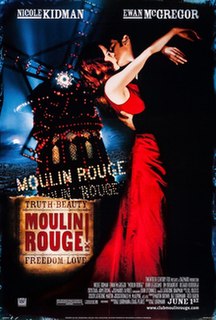Merely Players may refer to:
- Merely Players (play), a one-man stage show written and performed by Barry Morse
- Merely Players (film), a lost 1918 silent film drama
- "...merely Players", part of the Shakespeare monologue All the world's a stage
Merely Players may refer to:
Lock(s) may refer to:
The Wonderful Wizard of Oz or The Wizard of Oz most commonly refers to:
Super may refer to:

Moulin Rouge! is a 2001 jukebox musical romantic drama film directed, co-produced, and co-written by Baz Luhrmann. It follows a young English poet, Christian, who falls in love with the star of the Moulin Rouge, cabaret actress and courtesan Satine. The film uses the musical setting of the Montmartre Quarter of Paris and is the final part of Luhrmann's "Red Curtain Trilogy," following Strictly Ballroom (1992) and Romeo + Juliet (1996). A co-production of Australia and the United States, it stars Nicole Kidman and Ewan McGregor. John Leguizamo, Jim Broadbent, and Richard Roxburgh feature in supporting roles.
Joe or JOE may refer to:
Black bear or Blackbear may refer to:
Assignment, assign or The Assignment may refer to:
Jin is a toneless pinyin romanization of various Chinese names and words. These have also been romanized as Kin and Chin (Wade–Giles). "Jin" also occurs in Japanese and Korean.
Mash, MASH, or M*A*S*H may refer to:
Richard Gordon or Dick Gordon may refer to:
Player may refer to:
Doctor or The Doctor may refer to:
Cleo may refer to:
Karthik or Kartik may refer to:
OG, O.G., or Og may refer to:
Merely Players was a one-man stage show written and performed by Barry Morse. It examined the lives of a series of actors and others from Elizabethan times up to present day. The title is derived from lines by William Shakespeare in his play As You Like It:
All the world's a stage,
and all the men and women merely players:
They have their exits and their entrances;and one man in his time plays many parts.

Vivian Martin was an American stage and silent film actress.

As You Like It is a pastoral comedy by William Shakespeare believed to have been written in 1599 and first published in the First Folio in 1623. The play's first performance is uncertain, though a performance at Wilton House in 1603 has been suggested as a possibility.
Diegetic music or source music is music in a drama that is part of the fictional setting and so, presumably, is heard by the characters. The term refers to diegesis, a style of storytelling.
Zdena may refer to: